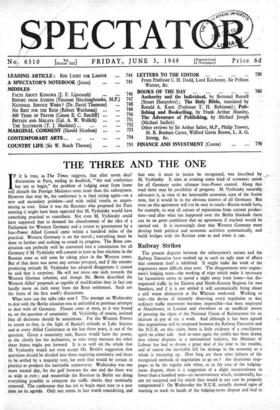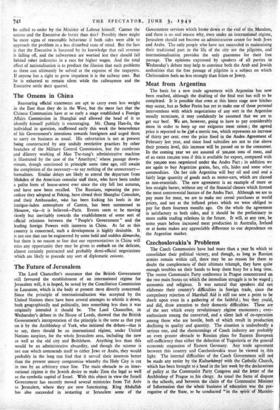Railway Strikes
The present disputes between the railwaymen's unions and the Railway Executive have worked up to such an ugly state of affairs that comment itself is inhibited. It might make the work of the negotiators more difficult than ever. The disagreement over engine- men's lodging turns—the working of trips which make it necessary for locomotive crews to spend a night away from home—has dis- organised traffic in the Eastern and North-Eastern Regions for two Sundays, and if it is not settled it 'will automatically bring about a still worse dislocation at the Whitsun week-end. Working to rule—the device of minutely observing every regulation so that ordinary traffic movement becomes impossible—has been employed at Manchester, in London and elsewhere as an unofficial means of pressing the claim of the National Union of Railwaymen for an increase in pay of los. a week. And although it has been agreed that negotiations will be reopened between the Railway Executive and the N.U.R. on this claim, there is little evidence of a conciliatory spirit on either side. And so once again the public has been drawn into labour disputes in a nationalised industry, the Minister of Labour has had to devote a great deal of his time to the trouble, and of course the inevitable bill for damage to the economy as a whole is mounting up. How long are these utter failures of the recognised methods of negotiation to go on ? Are disastrous stop- pages to be the regular rule when, as in the case of the lodging- turns dispute, there is a suggestion of a slight inconvenience to fewer than a hundred men—an inconvenience which, incidentally, has not yet occurred and for which they would in any case be properly compensated ? On Wednesday the N.U.R. actually showed signs of wanting to wash its hands of the lodging-terms dispute and had to be called to order by the Minister of Labour himself. Cannot the unions and the Executive do better than this? Possibly there might be more signs of reasonable behaviour if both sides were able to approach the problem in a less disturbed state of mind. But the fact is that the Executive is harassed by its knowledge that rail revenue is falling off, and the railwaymen are worried lest they should fall behind other industries in a race for higher wages. And the total effect of nationalisation is to produce the illusion that such problems as these can ultimately be solved at the expense of the taxpayers. If anyone has a right to grow impatient it is the railway user. But he is exhorted to remain silent while the railwaymen and the Executive settle their quarrel.



































